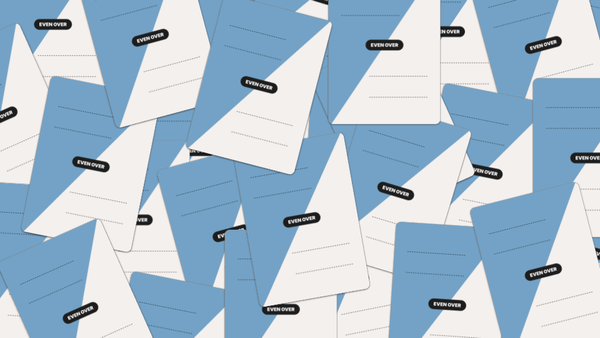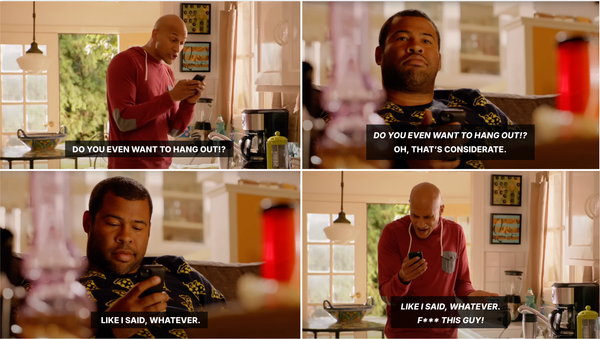Why Your Company Should Have a Readme

Julie isn’t a morning person. Amar does school pickup every afternoon. Ron likes to work on presentations solo before sharing.
Ever wish you had a cheat sheet that told you the unspoken things before you had to figure them out on your own?
Let us introduce you to the Readme.
The concept of a Readme started in software development, where a text file that introduces a project and is often the first file you read when arriving in a directory or archive of software.
While an effective tool for software, we’ve observed that the same concept gets applied to people and teams in fast-moving companies with strong cultures. And we think it’s the easiest way to upskill your team and work together effectively.
Everyone at Black Glass creates their own individual Readmes when they join the team, and we encourage our CMO members to make Readmes for themselves too. It’s a casual and easy way to distill some things about you – what you’re like to work with, how you behave at work – in an easy-to-digest format.
Here are the sections we find the most helpful out of the gate:
- Work Preferences/Principles – stylistic choices, habits and routines that people should know about when working with you
- Wonderful Quirks – Things we like about ourselves (or maybe things that you are actively trying to change), but that might bother some
- Thoughts About Your Industry – What are the things you keep repeating on the job? What do you believe to be true about your category?
- Fun Stuff. Astrological signs, hobbies, favorite books, enneagrams (and so on).
As we started our hiring process at Black Glass (we’re hiring!) we realized: companies should have Readmes, too.
And no, this is not the same thing as a formal vision and mission, set of values or letter from the founder/CEO, though those are important. This might not even be something you publish on your website (but if you do, we approve).
Those documents all still have a home – they do an excellent job detailing how and why the company does work in the world. But the Readme explains the unspoken how – how people in the company truly behave, how work gets done and how various attributes are valued.
It should be something that you share with prospective hires and partners. It should be something that your employees feel is accurate and have an opportunity to influence. And it should be something that changes over time as your company grows and learns.
A few tips for your Company Readme:
- Use the same sections as above but shift them from individual to company-level insights.
- Crowd-source the input from as many different employees as you can.
- Make it spicy and real. Don’t corporatize-it. Use an active voice.
- Keep it live - it’s never “done.”
If your company is really big, it’d be interesting to see how Readmes change from department to department. You’d probably gain a lot of insight. For instance, if Customer Service and Marketing have opposing work preferences highlighted in their Readmes, you can probably predict lots of conflict when they work together – and see quick ways to remedy that through changing the ways of working.
With that, here’s ours.
Black Glass Readme
Hey there. We are Black Glass! We’re a unique bunch of CMO consultants and advisors who come from varying backgrounds across marketing, advertising and consulting. Before you agree to work with us, we think there are a few things you should know about how we work and who we are.
Work Tenets/Principles
Making (in public) over Managing
Making means doing. Not planning to do. Not reviewing and managing others’ doing. Doing. We all make equally. Making here includes lots of writing (blog posts, Slack messages, internal documents, articles and thought leadership) and creating decks, graphics and client deliverables.
We do all this making in public. There are no private files here, and everything is on our Shared Drive. This means that your teammates will jump into your working docs before you’re “done” and start adding, commenting and building. This is new for a lot of people coming from larger firms.
Asynchronicity Drives Excellence (and Flexibility)
While we’re always happy to jump on huddles to work through things together, we err on the side of asynchronicity. We create the space and time for independent and deep thinking to bring really excellent new things into the world. If you’re someone who requires a lot of verbal processing with others, you might find this difficult – so please speak up if you want to find time to talk through things! Most of us are game to get on and workshop something with you when and if you need it. (See below: Beehiving.)
Beehiving for More Brain Power
When we’re not working asynchronously, we’re probably beehiving – huddling on Slack, jamming on a document together and then shipping it out. Beehiving is for those times when speed is critical, when we realize we need more brain power than one of us can give on our own. It’s not required that all folks be available for beehives (we believe strongly in #JOMO, the joy of missing out, and we’re not a consensus-driven culture), and they’re not planned in advance. We believe everyone brings value, so jump in when you can, if you can, and make a thing better.
When in Doubt, Send It
Everyone here is amazing at what they do, and we encourage them to put their work in front of clients. Yes, even before The Most Senior Person has blessed it. Our “checks and balances” on this are beehiving and making. Just make sure you share deadlines so the team can manage accordingly. While we love PMOs, we all lead and do our own work. No dedicated PMOs here.
Pivoting (For Good Reason)
We pivot a lot. But we have a good reason for it. We are constantly experimenting with new frameworks and delivery methods. As we get feedback and see what works, we change our approach as needed or pull together brand new messaging or materials that better represent our intent. This means we can’t be precious about not using the first (or second) version of things we create, and we often have to leave our egos at the door. If you don’t understand the pivot, just ask. We encourage questions, we don’t deflect. And, while we pivot, we also file away versions – most of the work done is often revisited and adapted. Nothing goes to waste.
Our wonderful quirks
Things we like about ourselves but that might bother some…and are likely to change as we grow:
- We play to our individual strengths. We believe in spiky leadership. If you’re not familiar with the concept, check it out! This means we lean into our strengths and don’t spend much time focusing on our weaknesses. Of course, there are some areas where we expect everyone to have competence: managing deadlines, communicating with respect, managing up & across, having high EQ and executive presence. Those are non-negotiables.
- We don’t have formal review cycles (at least for now). We’re small and lean. If you want someone’s help, feedback or a formal review, just ask! It is always meant with good intention, to make the work better and to make each other better.
- We shy away from engineered processes. If you have the option of using your time to make a deliverable or outline a process, please don’t outline the process. We’re too small to be bogged down by too many processes and tools. Obviously if we realize our way of doing something is unclear or causing confusion, we’ll adjust – but don’t expect to find many detailed process documents here. When they do exist, they’re as simple as possible.
- We have strong POVs and we share them. We mean what we say and we say what we mean. You might have to unlearn a lot of “corporate speak” when you get here. We want to be truthful, provocative and pointed in our perspectives.
- Sometimes we gold-plate things that shouldn’t be. We’ll occasionally push too hard for perfection, which gets in the way of us getting something out the door. We’re doing better at this recently, but it’s still something we have to monitor.
- We move with speed and intensity. We strive for impact with our clients and the market, so you can expect us to go quickly from idea to execution. We love to make, and we love to surprise and delight clients with quick delivery. But if you have competing deliverables, or personal plans that are in conflict, ask for help or clarify the delivery date, because sometimes we just move fast because we are excited and other times it is perfectly okay to slow it down a bit.
Some Thoughts on Consulting
- Outputs don’t have to be complicated. In fact, we think they should be as simple as possible. The purpose of our outputs is only in service of driving true change outcomes – not to sound smart.
- We’re people-people. Empowering teams is our not-so secret sauce (we think it’s the only thing that matters if transformation is the goal!)
- Theory is great, but practicality and usefulness is even better. Because we believe in impact, now. Delivery should focus on quick wins, bite-sized outputs that build over time for sustained impact.




